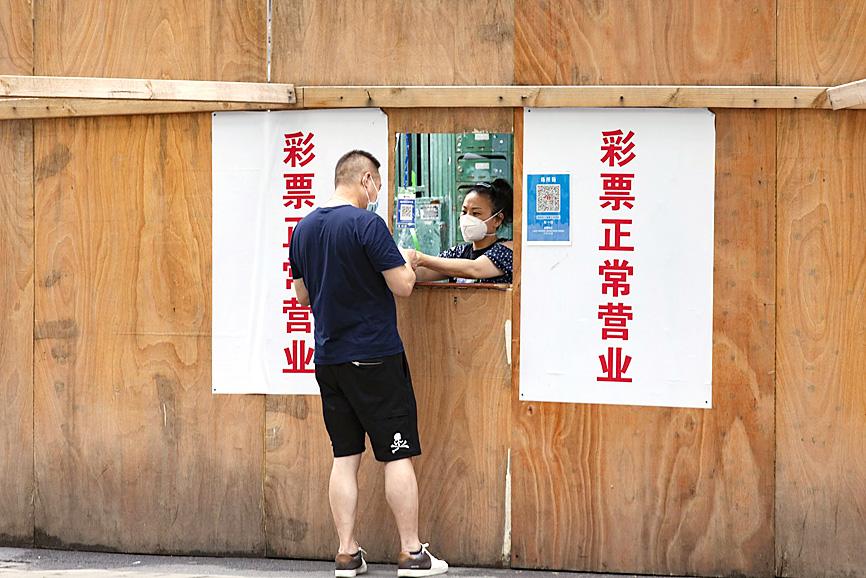China yesterday reported almost 700 new COVID-19 cases, with more infectious variants of SARS-CoV-2 continuing to test the nation’s hardline approach as outbreaks spread beyond major cities.
China reported 699 cases — the highest daily tally since May 22 — after recording more than 1,000 infections over the weekend.
Most of the cases are in the Guangxi region in the south, which recorded 243 cases — taking its total since the outbreak there flared six days ago to 829 — and remote Gansu Province, which reported 231 new infections, taking the number of cases there in the past week to 953.

Photo: Bloomberg
Most of Gansu’s capital, Lanzhou, has been locked down for almost a week and a lockdown was imposed in at least two districts of Beihai, a seaside city in Guangxi, trapping more than 2,000 tourists.
Many of them are stranded on the popular tourist island of Weizhou, after authorities on Sunday banned anyone from going to or leaving the island, Hongxing News reported.
A woman who was vacationing in Weizhou said she boarded a ferry on Sunday to leave the island, but it cruised at sea for two hours before turning back after authorities refused to allow tourists to land in Beihai.
She is back on Weizhou, but worries about getting food and other essential items because the island is locked down and most businesses are closed, Hongxing News reported yesterday.
While Shanghai’s situation is less dire, officials in the city, which endured a bruising two-month lockdown during April and May, are taking no chances and rolling out a testing blitz in 13 of the city’s 16 districts that are home to about 22 million people.
The financial hub reported 23 cases. Daily cases in the city have dropped from highs reached earlier this month, but they have held in double-digits for two weeks and high-risk areas continue to be locked down.
Chengdu, the capital of Sichuan Province, shut entertainment venues for seven days to control an outbreak that has grown to 35 cases since Friday.
Residents endured rain and wind at neighborhood testing stations on Friday and posted videos about the experience on social media.
Meanwhile, authorities in Guangzhou have apologized for breaking into the homes of people who had been taken to a quarantine hotel in the latest example of heavy-handed disease prevention measures.
State media said that 84 homes in an apartment complex in Guangzhou’s Liwan District had been opened in an effort to find any “close contacts” hiding inside and to disinfect the premises.
The doors were later sealed and new locks installed, the Global Times reported.
The Liwan District Government on Monday apologized for such “oversimplified and violent” behavior, the paper said.
An investigation has been launched and “relevant people” would be severely punished, it said.
China’s adherence to a “zero COVID-19” strategy, which requires mass testing, snap lockdowns and travel restrictions, has exacted a heavy economic and social toll.
Chinese President Xi Jinping (習近平) has made zero tolerance for COVID-19 a hallmark of his rule, saying the nation will not pursue “herd immunity” because it would exact too much of a toll, particularly on China’s elderly, who have lower vaccination rates.
Additional reporting by AP

MAKING WAVES: China’s maritime militia could become a nontraditional threat in war, clogging up shipping lanes to prevent US or Japanese intervention, a report said About 1,900 Chinese ships flying flags of convenience and fishing vessels that participated in China’s military exercises around Taiwan last month and in January last year have been listed for monitoring, Coast Guard Administration (CGA) Deputy Director-General Hsieh Ching-chin (謝慶欽) said yesterday. Following amendments to the Commercial Port Act (商港法) and the Law of Ships (船舶法) last month, the CGA can designate possible berthing areas or deny ports of call for vessels suspected of loitering around areas where undersea cables can be accessed, Oceans Affairs Council Minister Kuan Bi-ling (管碧玲) said. The list of suspected ships, originally 300, had risen to about

DAREDEVIL: Honnold said it had always been a dream of his to climb Taipei 101, while a Netflix producer said the skyscraper was ‘a real icon of this country’ US climber Alex Honnold yesterday took on Taiwan’s tallest building, becoming the first person to scale Taipei 101 without a rope, harness or safety net. Hundreds of spectators gathered at the base of the 101-story skyscraper to watch Honnold, 40, embark on his daredevil feat, which was also broadcast live on Netflix. Dressed in a red T-shirt and yellow custom-made climbing shoes, Honnold swiftly moved up the southeast face of the glass and steel building. At one point, he stepped onto a platform midway up to wave down at fans and onlookers who were taking photos. People watching from inside

Japan’s strategic alliance with the US would collapse if Tokyo were to turn away from a conflict in Taiwan, Japanese Prime Minister Sanae Takaichi said yesterday, but distanced herself from previous comments that suggested a possible military response in such an event. Takaichi expressed her latest views on a nationally broadcast TV program late on Monday, where an opposition party leader criticized her for igniting tensions with China with the earlier remarks. Ties between Japan and China have sunk to the worst level in years after Takaichi said in November that a hypothetical Chinese attack on Taiwan could bring about a Japanese

The WHO ignored early COVID-19 warnings from Taiwan, US Deputy Secretary of Health and Human Services Jim O’Neill said on Friday, as part of justification for Washington withdrawing from the global health body. US Secretary of State Marco Rubio on Thursday said that the US was pulling out of the UN agency, as it failed to fulfill its responsibilities during the COVID-19 pandemic. The WHO “ignored early COVID warnings from Taiwan in 2019 by pretending Taiwan did not exist, O’Neill wrote on X on Friday, Taiwan time. “It ignored rigorous science and promoted lockdowns.” The US will “continue international coordination on infectious